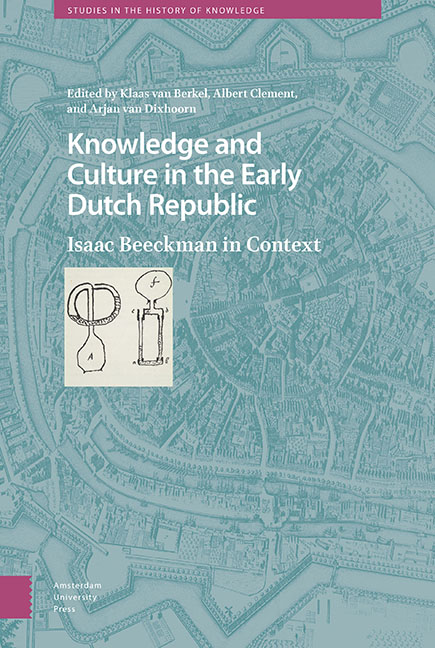16 - What’s in a Language?: Dutch and Latin in Isaac Beeckman’s Journal
Published online by Cambridge University Press: 07 October 2022
Summary
Abstract
This chapter aims to explore Beeckman's use of Dutch and Latin in combination with his thoughts on the purification of language by using his Journal. When studying Dutch in the Low Countries Simon Stevin (1548-1620) cannot be overlooked. This essay firstly investigates specifically which words Beeckman used to document his observations by studying whether he used any of Simon Stevin's neologisms; however, only seven were found in the manuscript. Secondly, it examines Beeckman's code switching and finds that Beeckman uses Dutch for artisan-related entries. Lastly, it searches the manuscript for entries on languages but merely three related entries were found. It concludes with the statement that Beeckman did not show active involvement in the purification of the Dutch language and mostly preferred to use the Latin language.
Keywords: Isaac Beeckman, code switching, Latin versus Dutch, Simon Stevin, purification, vernacular
Introduction
Throughout the Middle Ages, Latin had been the dominant language of learning and knowledge in Europe. Any conversation between educated men, and occasionally women, about learning or about science would be conducted in Latin. Its dominance remained the standard in the sixteenth and seventeenth century, although it gradually received more and more attention. Around the beginning of the sixteenth century, the functions of language in general and the relationship between Latin and the vernacular languages in particular developed into a significant and critical subject of discussion for religious and social reformers. At this time, multilingualism was not a new concept; Europeans were accustomed to the many different dialects and languages within and between the countries of Europe. Around the second half of the sixteenth century, however, these encounters with various languages sparked something described as a ‘fascination with language’. The Latin language, in particular, received increasing attention in these changing views. It became a popular idea to look at the riches and poverty of a certain language and to compare these to those of other languages. The comparison between a vernacular language and Latin generally resulted in an emphasis on the poverty found in the former in terms of vocabulary. In order to tackle this, some proposed to borrow words from different languages, while others preferred to invent new words.
- Type
- Chapter
- Information
- Knowledge and Culture in the Early Dutch RepublicIsaac Beeckman in Context, pp. 415 - 450Publisher: Amsterdam University PressPrint publication year: 2022



